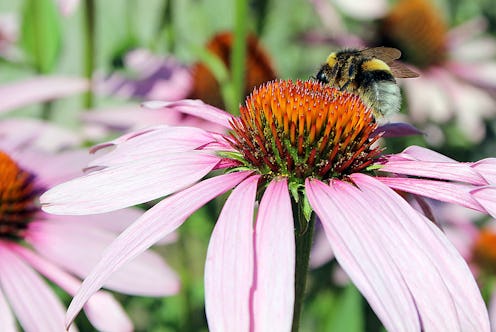
It's flu season and, like every winter, my top purchases seem to be echinacea and vitamin C. Fearing the dreaded flu that could easily put me out of commission for a week, I make sure my vitamin C game is poppin'. As soon as I hear a sneeze at the bar, I'm definitely reaching for an echinacea or two to make sure my immune system doesn't suffer at the expense of a flu-ridden stranger. According to Life Extension’s Fourth Edition, Disease Prevention and Treatment, echinacea has been used and proven to fight infections, the flu, and the common cold. That's enough to keep the supplement on hand in my medicine cabinet, but what I didn't know was that echinacea is good for skin and hair as well! In fact, echinacea is making its way into mainstream beauty care for its well-known healing properties.
Growing up, I never felt the thrill of DayQuil or the beautiful sleep that NyQuil brings; my parents used elderberry, echinacea, and foods rich in vitamin C until I felt better. Of course, the first time I ever actually dabbled in DayQuil, I was up for 24 hours, which was exactly the opposite of what my sick body needed. My parental units didn't trust the medicine that they deemed "new" no matter how safe or effective it claimed to be. The history of echinacea is much older than OTC remedies, Native Americans have been using the leaves, flowers, and root of their native plant to make medicine for centuries. Every year in July, the flowers bloom at my parents house and this year, I will be dancing in my mother's garden to nab up those leaves for some serious DIY beauty action.
According to Skincare news, most of the research conducted on echinacea for topical purposes has been done in Germany. As a result, the German government has approved the use of echinacea for skin ailments and conditions from wounds, acne, and eczema. Skincare news goes on to discuss clinical studies on echinacea where 85 percent of approximately 4,500 subjects found their eczema improved after using echinacea for treatment. Now, this is big seriously big stuff: It's rare that a plant, regardless of the anecdotal evidence, has significant science to back it up. Personally, I look at nature as my personal playground for beauty regardless of scientific data, but I'll take scientific evidence when I can get it!
Due to the research that has shown the powerful antibacterial, antibiotic, and anti-inflammatory properties of echinacea, I have no doubts that this is going turn those frown lines into a smooth, wrinkle-free smile. In fact, sources at Stylecraze claim that topical use of echinacea is rich in tannins and has the ability to reduce the size of pores. Apparently, what studies have found is that echinacea can prevent the creation of enzymes that get in the way of blocking out bacteria and viruses... you know, so we can continue to live our lives.
Echinacea can be a natural remedy to treat boils, moderate acne, and psoriasis, so let's start making some DIY recipes that the earth has gifted us — free of charge, if you are growing your own echinacea. For the rest of us lacking a green thumb, you can purchase echinacea extract at your local vitamin or health food shop for around 12 bucks.
Face Pack
I've dubbed this recipe a face pack, instead of a face mask, because whenever my face is just lookin' sick from lack of sleep, a cold, or just poor diet, it gives me all the nutrients that my skin and body needs to get back to normal. I use 1/4 cup of oatmeal, three tablespoons of manuka honey, two tablespoons of chamomile tea, and six drops of echinacea abstract. Alternatively, you can make an echinacea tea with a fresh plant by boiling the leaves in filtered water — use about two tablespoons if that's the case. Apply your face pack onto a make-up free face and leave on until it begins to dry.
Hair Mask
This recipe comes from Stylecraze and I couldn't have found it at a better time. For lackluster strands that need shine and volume, use this mask to fight the trials and tribulations of winter. Combine fresh aloe vera, echinacea tea, and six drops of tea tree oil (though I personally prefer to use lavender tea tree for hair recipes) and mix vigorously. Use this mask in lieu of shampoo once a week and proceed with your normal conditioning routine.
Image: Giphy; Pimthida, Nathan Cooke, Lotte Grønkjær, M a n u e l/Flickr